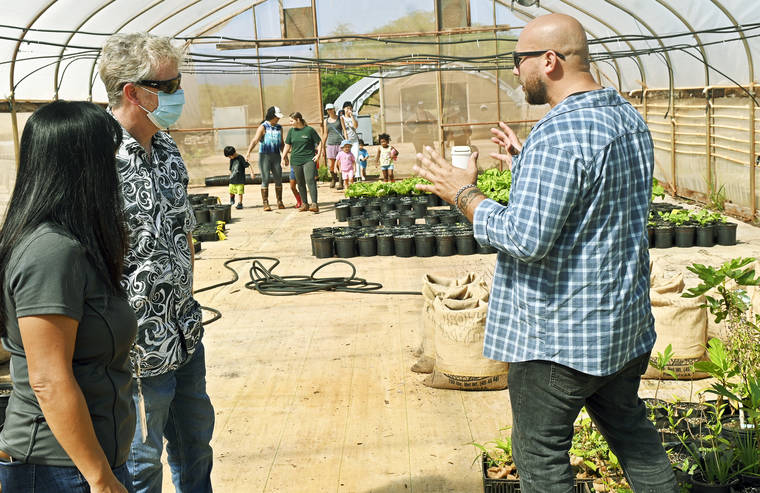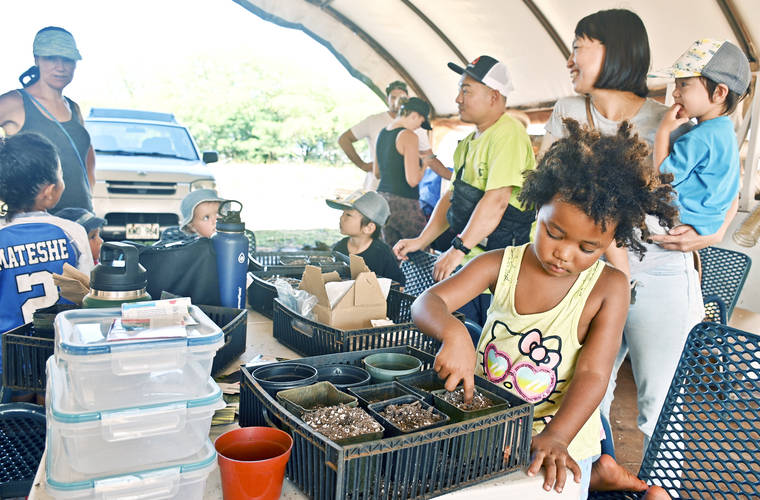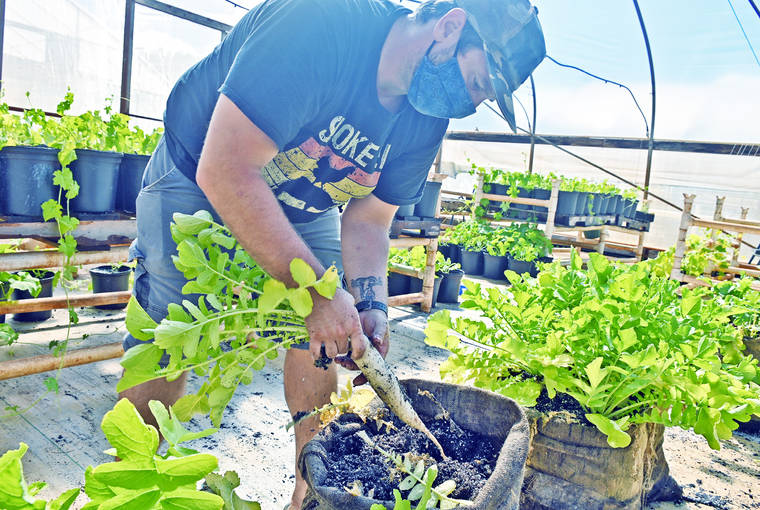WAIMEA — Samson Arzamendi, a worker under the Kupa‘a Kaua‘i Rise to Work program, was pleased with the daikon and radish he pulled from the soil in used Kaua‘i Coffee Company plantings Tuesday morning.
“We’re going to work on pickles,” Arzamendi said. “We can use the tops for kim chee. We’re trying different types of radish today.”
Emilio Ruiz-Romero, owner of Resilient Roots, said the recipes being designed by Arzamendi will be collected into a cookbook and made available to consumers as part of the Resilient Roots’ mission of changing the perception of local foods.
Resilient Roots is part of a collaborative community network utilizing one of the 11 shade houses being leased to The Monkey Pod, a Kaua‘i nonprofit that was registered in 2017 to support and grow sustainable communities through agriculture.
“We don’t grow anything in Waimea anymore,” said Laurie Yoshida of Corteva Agriscience. “We have the greenhouses in Kekaha where everything is grown. The greenhouses here in Waimea are on the same lease as our main office facility, and we didn’t really want to get rid of the greenhouses, so we leased them out with the provision that the new tenants maintain the houses and the surrounding areas.”
Ruiz-Romero serves on The Monkey Pod board, and is only one of the tenants doing work in the greenhouses, that measure approximately 3,000 square feet apiece. Some have been damaged by weather events and don’t have roofs, but the lessees work around the inconvenience at the Kaua‘i Farmers Shade House Initiative, a term being assigned to the former Corteva greenhouses in Waimea.
The owner of Resilient Roots said the cookbook project is just a side trip from his main mission with ulu (breadfruit), a sustainable food product.
“My goal is to propagate and donate ulu trees to the community,” Ruiz-Romero said. “Already, I have 10 plants ready for Grove Farm. I want people to talk to me. I can hear of their intentions, where they want to plant, how much they want to plant, and help them so the trees are successful. I’ve already received sign-ups from several people, and I also put some out at the farmers’ market under Hale Puna under the monkeypod tree.”
Mark Stoutemyer of Corteva Agriscience said that, in addition to the lease to The Monkey Pod, Corteva supports the growers with additional resources such as soil and connections to other community resources like Kaua‘i Coffee Company, which now provides used burlap bags that are utilized as planters.
Tuesday also marked the first day volunteers were welcome to the Kaua‘i Shade House Initiative, the Waimea project welcoming an informal group of parents and keiki who met while their keiki participated in the Tutu and Me traveling preschool. The group, taking a brief tour through the Resilient Roots greenhouse and getting select pieces of harvest, was intent on its mission of planting seeds and painting.
“The focus of the Kaua‘i Shade House Initiative is on connecting Kaua‘i farmers, businesses and residents to greater economic opportunity and food security through sustainable, community-oriented farming practices,” Ruiz-Romero said in a social-media post. “Planting food trees and helping to create a consistent source of raw produce is laying the foundation for the future of local commerce on Kaua‘i.”





